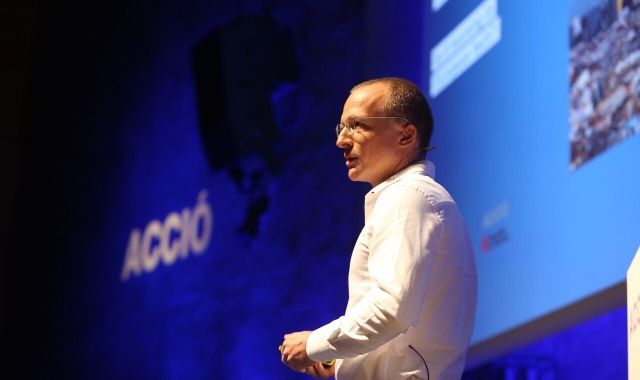
Investment in technology startups is experiencing a record moment in Europe. Never has so much been invested as in the past 12 months: 17.8 billion euros in European companies. It is something that Yoram Wijngaarde knows well. He is the founder of Dealroom, a platform with more than 500,000 companies and 10,000 investors that have turned it into the largest database of entrepreneurial technology and venture capital on the continent. Wijngaarde was asked to give the inaugural speech at Acció’s 22nd Investment Forum, held on Thursday morning. He later spoke to VIA Empresa about the optimism currently surrounding investment. There is more money than ever because no one wants to miss out on a slice of the very tasty pie.
What is Dealroom?
Dealroom is a company based in Amsterdam that was founded in 2013. We help large firms and investment funds to find interesting companies to invest in. We do this by providing them with market intelligence or knowledge of new trends and developments so that they are better informed when it comes to making a decision to invest. We also help large companies to identify startups at an initial stage with whom they can form an association.
Who gets the most out of it? The investors or the entrepreneurs?
We try to strike a balance between the two, but we make the money with the venture capital investors. However, as we also want the startups and entrepreneurs to be on the platform, we offer them free tools. For example, they also get market intelligence and we help them to find the best investors for the company with free online tools. But we do not give them an additional personal service to find money. It’s simply a case that they can use our platform for free.
You opened the Acció Investment Forum with a talk called ‘the state of tech: is it morning in Europe?’ But you didn’t give an answer...
No, I didn’t give a clear answer because I think it is still too soon to do so. At the moment what we can see is that there is record investment, but that in itself is not a cause for celebration. All it means is that people are very optimistic right now. But for some reason there is more money than ever to invest. I think, for example, that if the French elections had gone differently it would have been disastrous for Europe. It seems as if we have bought a little more time to find the way for the EU to remain united. And I think that this is a vital factor for the European tech ecosystem.
“There is no correlation between exit performance and the money invested”
Where has all this available money to invest suddenly come from?
Most of it continues coming from within Europe itself. We are seeing existing funds getting more money and at the same time new funds that are getting a lot of funding. But as far as I know the amounts have not grown in the past year. Therefore, the increase in money is really fruit of the risks that companies are taking. A lot of people, inspired by Facebook, Google or Uber, do not want to miss out on the current moment. Companies like Volkswagen or BMW are seeing their role change and they have to get on board. There is some fear about missing out on this new world, which in part explains this rise in investment.
Journalists are the first to write grand headlines about big funding rounds, but is it always a case of the bigger the better?
No, it’s not at all a case of the bigger the better. In fact, the biggest exits are normally of companies that have not attracted a lot of capital. Here an example is Social Point, which hadn’t raised an extraordinarily high amount of capital. Yet, it is a bit of a conflictive issue. There is absolutely no correlation between exit performance and the money invested in the company beforehand.
“The biggest exits are of those companies that haven’t attracted a lot of capital”
You also spoke about anticipated exits. What do you mean?
It is a company that shows such promising scalability in becoming large that it is sure to end up in an exit.
What anticipated exits are there in Barcelona?
Letgo, obviously. Then there is CornerJob, Typeform and smaller ones like TravelPerk, a B2B travel platform that is also doing very well.

Yoram Wijngaarde during his talk at Acció’s Investment Forum | Ceded
Is the fact that the United Kingdom and Germany show the best returns for investors only due to the size of their markets?
In Germany, most of the returns come from the rocket Internet, where there is some controversy about whether it has been executed particularly well. When the European Internet was still not mature or developed, there were a lot of people in the sector acquiring consumers in an inefficient way, creating large companies inspired by American models. Yet, I think that Europe has now grown up and many companies now know how to set up a good business on the Internet. That is far as Germany is concerned.
I think the United Kingdom is many years ahead of the rest of Europe. London has been the epicentre where all the major talent and development had to be. If you are a computer engineer from a small town in Italy or France and you want to work in tech, you had no choice but to go to London. This is the reason for such good performance.
“On the international scene Barcelona is taken very seriously”
For a while Barcelona has wanted to position itself as a genuine tech hub in the south of Europe. Given Dealroom’s data and trends, can it do it?
Yes, without a doubt. In fact, I think it is happening. On the international scene Barcelona is taken very seriously. There is London and Berlin, and then Paris, Barcelona, Stockholm and maybe Amsterdam.
You say the international tech sector takes Barcelona very seriously. Does the political situation in Catalonia have an influence?
To be honest, I don’t know the political situation in Catalonia well enough. I have heard that there is a separatist movement, but I do not how serious the issue is.
In your talk, you put trust in institutions on the same level as opportunity as key elements in attracting investment. Could the uncertainty in Catalonia today affect this?
For a start I have to say that all the investors I know in Spain do not support the separatist movement. Most of them are travelling all the time between Madrid and Barcelona and they have an open mentality. That is what I know for sure. If Catalonia were to separate from Spain, it could be comparable to Brexit in the sense that perhaps it would not have an immediate effect: entrepreneurs would continue doing what they do and maybe the venture capital funds would not care much about it. But there could be a small silent erosion of the institutions you need. For example, in London it will become hard to find nurses because many of them are immigrants and they will not want to continue coming. These vulnerable parties are the ones that could produce some negative effect in the long term.